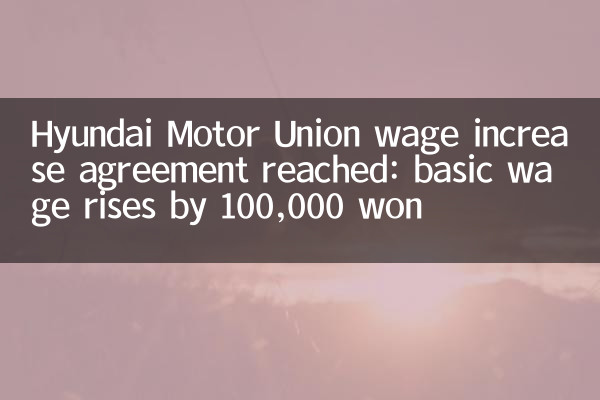Hyundai Motor Union wage increase agreement reached: Basic wages rise by 100,000 won
Recently, Hyundai Motor Union and the company's management reached an important salary increase agreement, with the basic salary increasing by 100,000 won (about 540 yuan). This agreement not only ended months of labor-management negotiations, but also set a new benchmark for the wage standards of the South Korean auto industry. The following are the detailed contents and structured data of this event.
1. Main contents of the agreement

Under the agreement, Hyundai Motor employees' basic salary will rise by 100,000 won, while additional performance bonuses and other benefits will be received. The following are the specific contents of the agreement:
| project | content |
|---|---|
| Basic wage increase | 100,000 won per month |
| Performance bonus | 200% of annual salary |
| Other benefits | Increase medical insurance coverage |
| Validity period of the agreement | 2023-2025 |
2. The background and process of labor-management negotiations
The conclusion of this salary increase agreement was not smooth. Hyundai Motor Union has organized strikes many times since the beginning of this year, demanding increased wages and improved working conditions. The main demands raised by the trade union include:
| Request | Initial request | Final result |
|---|---|---|
| Basic wage increase | 150,000 won per month | 100,000 won per month |
| Performance bonus | 250% of annual salary | 200% of annual salary |
| Working hours | Reduce 2 hours per week | Maintain the status quo |
After multiple rounds of negotiations, the two sides finally reached a compromise on basic wages and performance bonuses, but failed to make progress in working hours.
3. Industry impact and expert opinions
The salary increase agreement has had a profound impact on the South Korean automobile industry. Here are the main views of experts and analytical agencies:
| Organization/Expert | Viewpoint |
|---|---|
| Korea Automobile Industry Association | The agreement may trigger a chain reaction from other automakers and push up the overall salary level of the industry. |
| Professor of Economics at Seoul University | A salary increase can help alleviate inflationary pressures, but may increase business costs. |
| Hyundai Motor shareholder representative | The agreement balances employee welfare and corporate profitability, which is a win-win situation in the long run. |
4. Reaction between employees and the public
After the agreement was announced, Hyundai Motor employees and the public responded mixed. Here are some representative voices:
| group | reaction |
|---|---|
| Union Members | Basically satisfied, but still hope to further improve working conditions in the future. |
| Employees of other car companies | I hope my company can follow up with similar salary increase plans. |
| consumer | Worrying that car prices may rise due to rising costs. |
5. Future Outlook
This agreement is not only an important milestone in Hyundai's labor-management relations, but also provides a reference for the future development of the South Korean automobile industry. As competition in the global automobile market intensifies, how to balance employee welfare and corporate benefits will become a common issue faced by all car companies.
Hyundai Motor said it will continue to communicate with the union in the future to ensure the company's sustainable development. At the same time, other Korean automakers such as Kia and Shuanglong have also begun similar negotiations with the trade union, and the industry's salary standards may usher in a new round of adjustments.
Overall, the conclusion of this salary increase agreement marks an important step in Hyundai's labor-management relations, but its long-term impact still needs to be observed.

check the details

check the details